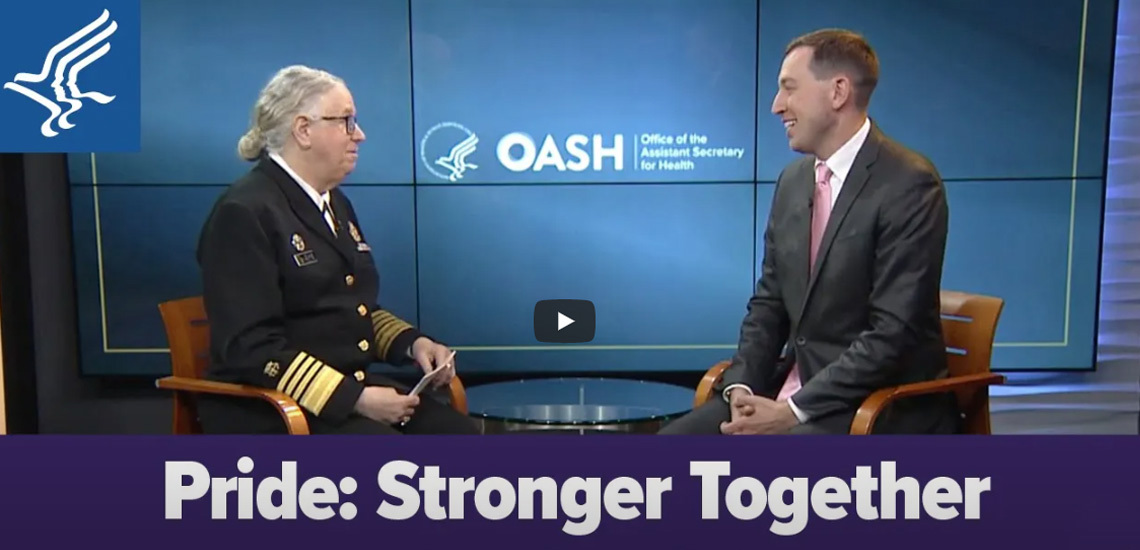Addressing Health Disparities: Dr. Jesse Ehrenfeld on LGBTQI+ Healthcare Access & Barriers
27 Jun 2024

In a recent video series by the U.S. Department of Health and Human Services—Pride: Stronger Together—Assistant Secretary for Health Admiral Rachel Levine spoke with APB Speaker and the 178th President of the American Medical Association (AMA) Dr. Jesse Ehrenfeld. The pair covered the health disparities LGBTQI+ patients face and how to remove barriers to access to healthcare. To celebrate PRIDE month, we’re highlighting a bit of their conversation. Here’s what they had to say.
Levine: So I guess the first question would be, is there a specific LGBTQI+ medical issue,
a medical topic that's really important to you?
Ehrenfeld: You know, for me, it's all about getting patients the care that they need that's personalized and preventive. And unfortunately, LGBTQI+ people are less likely to have a regular doctor or regular source of care compared to everybody else. And that means that they often forego preventive screenings.
And the only way that people can get the care that they need that's personalized, that meets needs, the needs of their families, is if we're honest with our practitioners, our physicians, our provider healthcare teams about your sexual orientation and gender identity status.
So coming out to your doctor isn't just the right thing to do, it means that you get personalized care. And so that's an important issue that I think is important to share out with your real listeners.
Levine: So how can physicians and other medical providers provide just generally affirming care to LGBTQI + people and their families?
Ehrenfeld: Well, you know, affirming care starts with being listened to and feeling heard. And, you know, I'm a gay dad. My husband and I have two beautiful boys. We've had experiences where, you know, you start by filling out the paperwork, the form, and it asks for the mom and the dad. And that's not a very affirming approach to welcoming a family into a clinic or setting.
We had a situation where we were actually at the dentist, one of our boys wasn't exactly thrilled about being there, and the person at the dental office said, "Well, next time, why don't you have your wife bring your son in?"
Well, he doesn't have a mom. He has me. And so, you know, when we make those assumptions in a healthcare context, it can be ostracizing. It can be hard for LGBTQ + patients to hear those words that make them feel like they're not a part of the system—that they are excluded.
So by making sure that we're inclusive through language and words and really listening and hearing who our patients are, everybody does better and gets the care that they need. We all have had those difficulties. So, though I think the things are getting better, I think that the medical community has heard that message. Things are getting much, much better, and I will tell you, I'm very proud of the work that the AMA Foundation's done to support the nation's first LGBTQ+ health fellowships at a couple of medical schools across the country, bringing more competency to more and more physicians across the nation.
Levine: Why don't you talk about some of those health disparities?
Ehrenfeld: Unfortunately, if you are LGBTQI+, you are more likely to live sicker and die younger. And that's because not of biology, not genetics. It's because of those upstream drivers, social determinants of care. It's more likely to not have health care access, more likely to not be insured, having difficulty getting regular employment or safe place to live.
So we need as a society to make sure that we start to address those foundational drivers of health because that's what's going to solve these foundational health equity issues. What can we do as physicians? We need to make sure that our practices are inclusive, that they are affirming, And then we give the best personalized preventive care to every patient who walks in our door.
Levine: Well, as you know, we're entering Pride Month. It's so exciting. So, for you and your family, what does pride mean to you?
Ehrenfeld: For me, pride is about amplifying the voice of the community. I grew up in an era where I didn't know if I could ever be an out gay physician. I didn't see myself represented on TV or in leadership. And obviously, the visibility that I've brought to the AMA through my role as the first gay president has been a really humbling opportunity. The visibility that you bring in your role as the Assistant Secretary is just phenomenal. And I hope that people who are out there listening see that it is possible to do great things and make important contributions to society regardless of your sexual orientation and gender identity.
